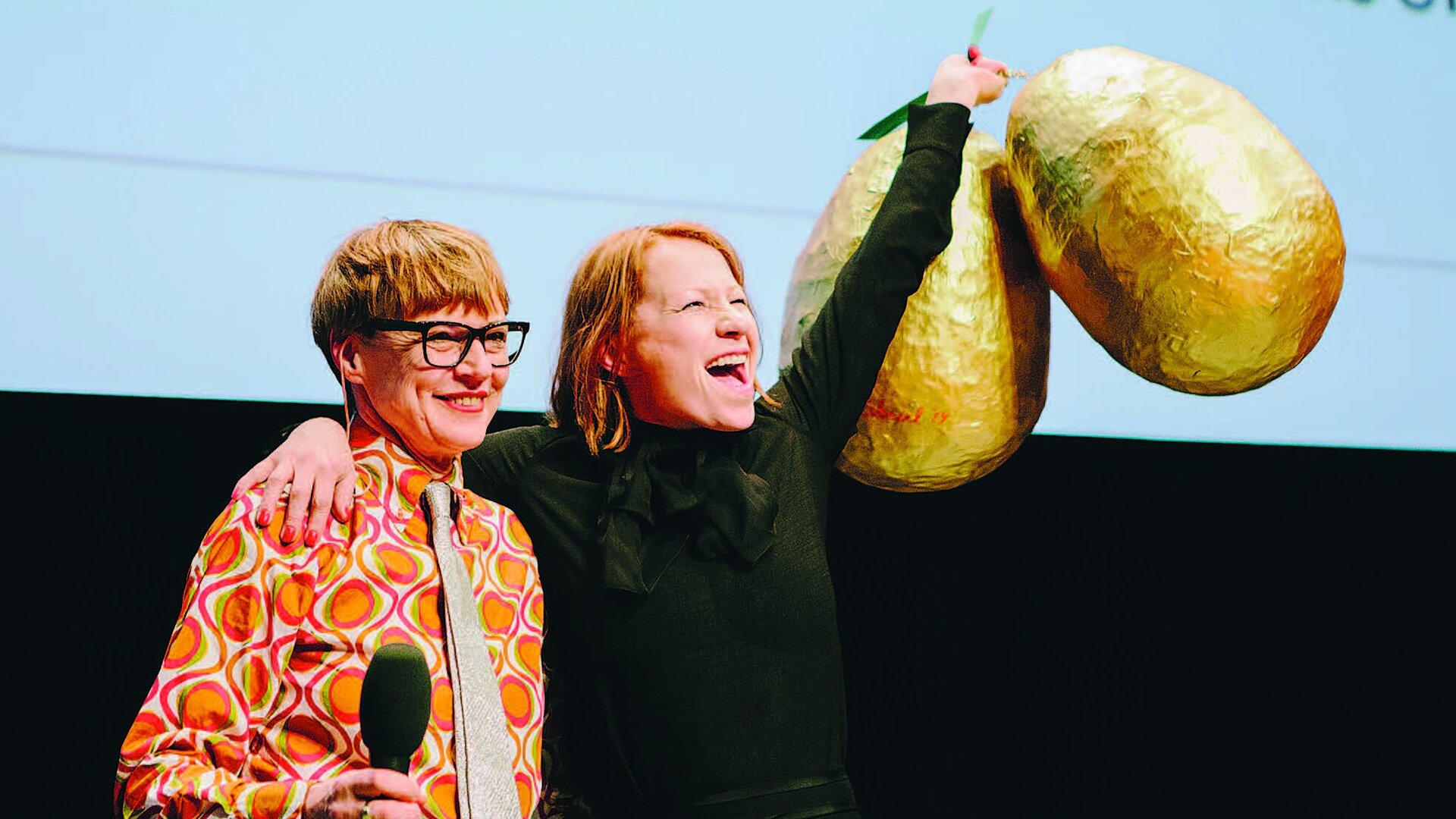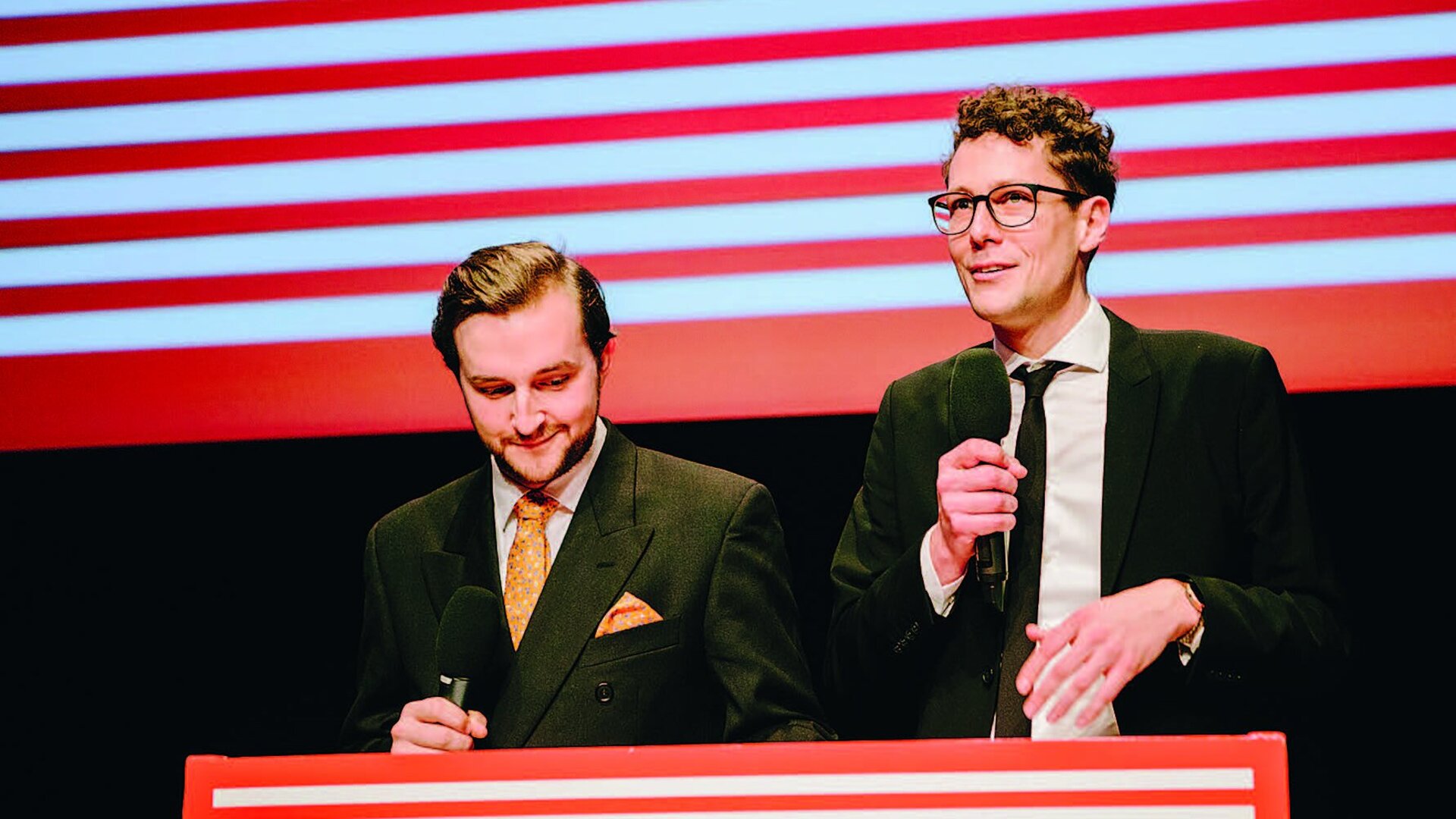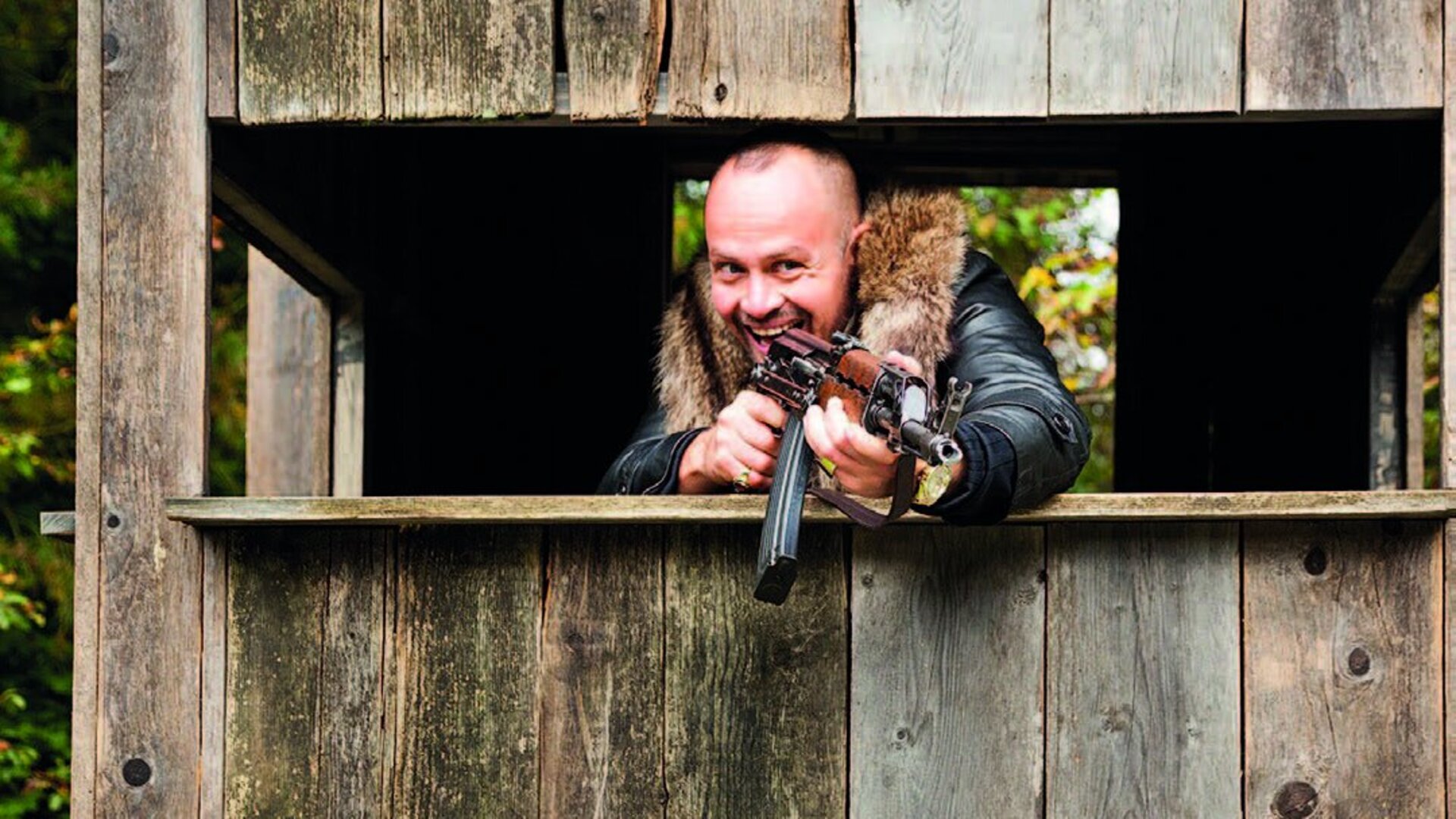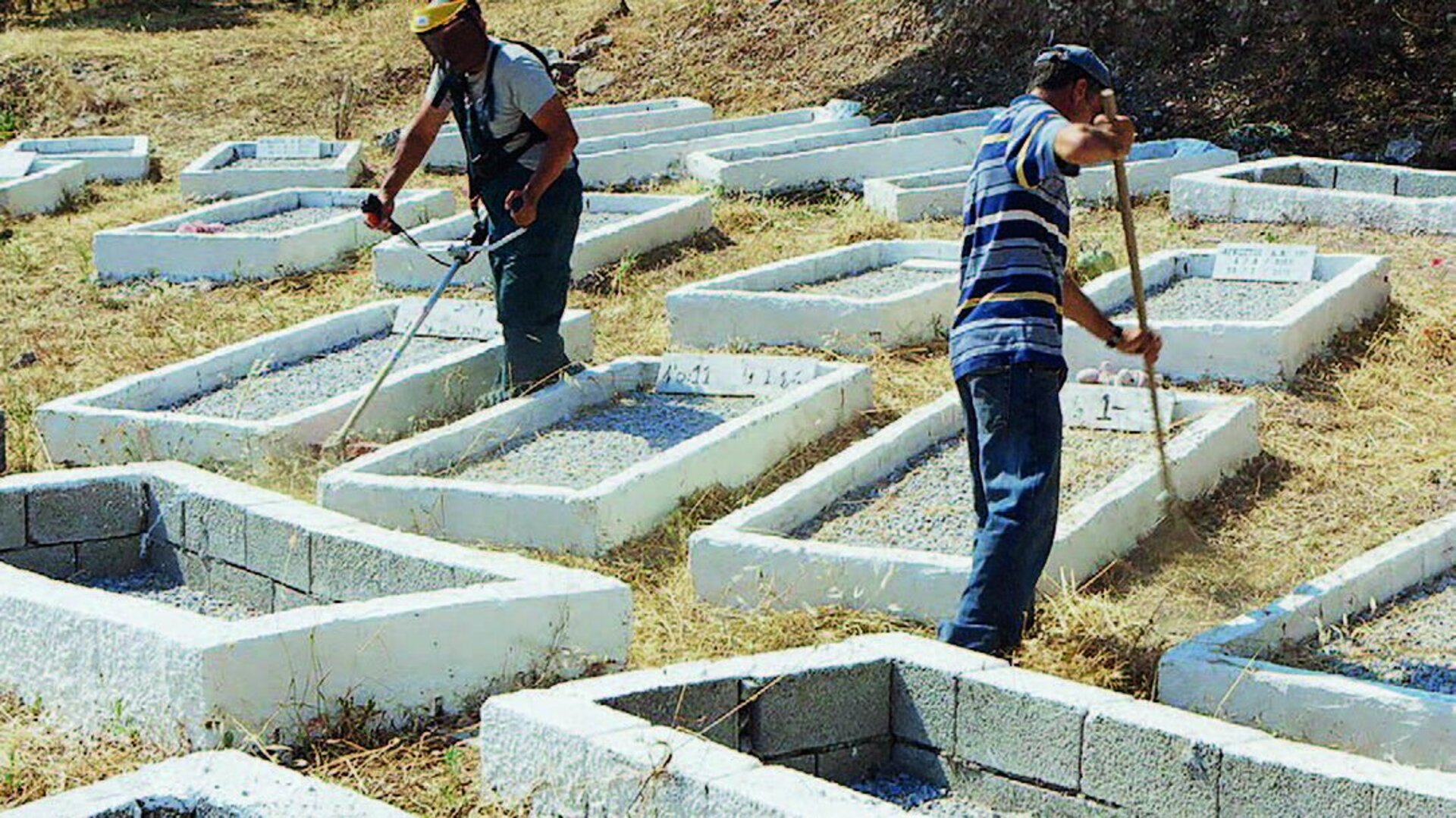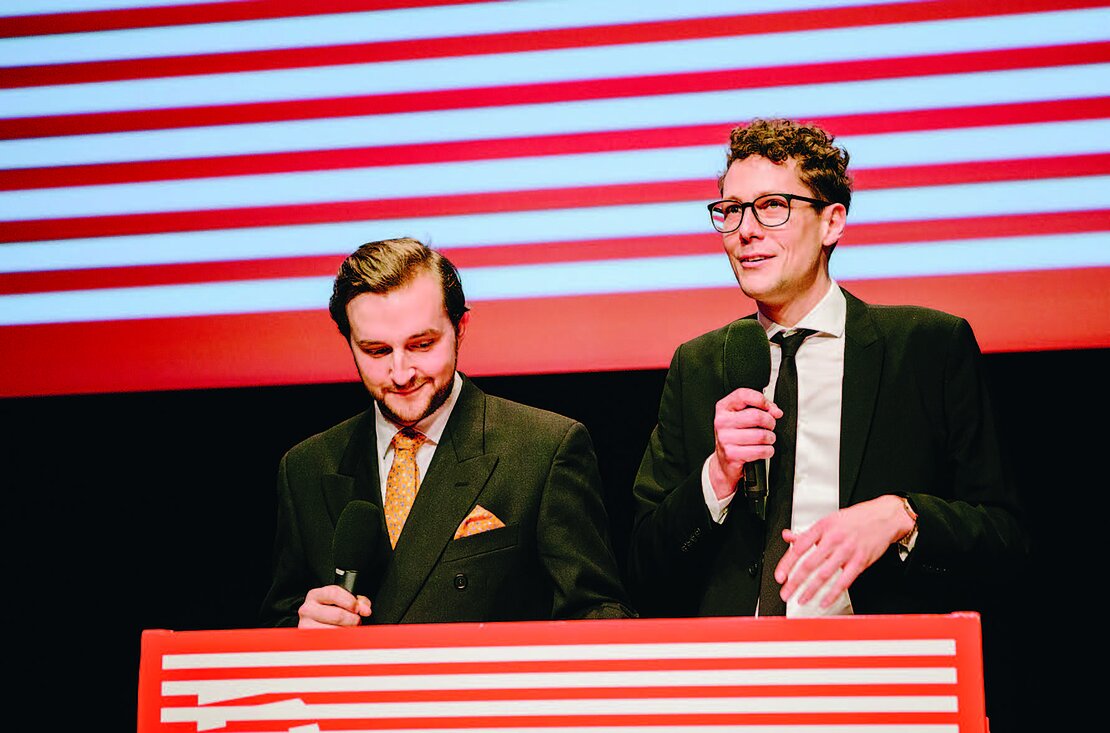“Nationalism is poison for society", Sebastian Höglinger, one half of the "charming directors", as the second presenter Manuel Rubey introduced themselves at the opening, stated succinctly. He didn’t have to say more. The over 2,000 guests at the opening event - after all, the List Hall in Graz is transformed into the largest cinema in Austria on this day - showed their approval by continued applause. After the applause has slowly died down, Höglinger was able to get it straight, this is the title of this year's Diagonale trailer by Johann Lurf and that Diagonale 2019 actually has no motto, the title of the trailer would suffice. Afterward Peter Schernhuber stated that everything had already been said anyway and he would get along with it.
This charming and likeable duo, who are forming something like the head of the festival, is contributing very much by showing their own appreciation regarding the festival and is therefore infecting the audience with their enthusiasm. Every year, despite loads of stress and admirable efforts, the two manage to convey in a relaxed, calm, almost relieved and enthusiastic way how happy they are that the Diagonale is finally starting again. The exaggerating drama, which always had a little "it wasn't easy" statement, has disappeared. Almost youthful joy, joy of film and celebration is the motto - and Sebstian Höglinger also mentioned this year as an interjection that what he had already said in the past years, it's all about celebrating properly, applies again.
Rethinking
Of course, this is clearly part of the programme, because the audience, even at the many events outside the cinema, consists to a large extent of young talent, who also find viable platforms here, such as the Cinema Next Breakfast developed by Dominik Tschürtscher. Even the Film Academy, which, as we have heard, assumed that the students would make a well-behaved pilgrimage to Metternichgasse or Linke Bahngasse during the Diagonale instead of going to Graz, has changed its mind. On the panoramic floor of the Kunsthaus Graz, where the Press and Guest Centre is located, regular lectures were held during Diagonale - after all, almost all students had come to Graz anyway.
Golden Balls
Back to the opening. This year's grand prize for drama went to Birgit Minichmayr, whose exceptional talent doesn’t need any description. Visibly touched and moved by the very personal laudation of Veronika Franz and Johanna Orsini-Rosenberg, she accepted the work of art that will be presented to the winners of the Acting Prize - Ashly Hans Scheirl, the creator of the prize, emphasized that it is not a prize like the others, but rather a work of art. This year the prize was called "golden balls” and looked exactly like what everyone can think of now (see photo). "I can use these," shouted Birgit Minichmayr. "You already have them," was the prompt reply.
A separate screening was dedicated to the work of experimental filmmaker Johann Lurf, who is also responsible for this year's festival trailer, which was officially described as follows: "A rigid shot of a colourful water wheel turning in the nightly course of a river. The setting of Cavalcade seems simple. However, the effect of Johann Lurf's film on the basic parameters of the medium is based on a sophisticated experimental arrangement: on the interplay of light, recording apparatus and kinetic energy, without which the illusion of stillness and movement would not be possible".
A controversial film, shot on "real" film
As unanimous as the Acting Prize met with approval, the reactions to Marie Kreutzer's opening film "Der Boden unter den Füssen" (The Ground beneath our feet), which is said to have provoked roughly the same divided reactions in this year's Berlinale Competition, were different. Her portrayal of the constant threats to which the protagonist (Valerie Pachner) is exposed by her job, her boss (Marvie Hörbiger), with whom she has a love affair, and her mentally ill sister (Pia Hierzegger) are intense, sometimes frightening and marked by a grandiose performance by the actresses. Nevertheless, a part of the opening audience did not want to or could not follow Kreutzer, at least that’s what one could grasp through the following small talk. But after each film there are one or two critical voices. During the time of the Diagonale, "Der Boden unter den Füssen" was started to be shown in the cinemas, and by the time this issue is released we will already know whether the success at the Berlinale and Diagonale has also been realized at the box office.
In any case, the theatrical release during the festival in Graz was certainly a clever move by the distributor, who knew how to gather attention. By the way, Kreutzer shot the film on 35 mm, in other words on “real” analogue film, as she empathized at the opening, not without mentioning her camera woman Leena Koppe, who has already photographed several of her films. Production manager Gottlieb Pallendorf, whom I met the next day at the already traditional meeting of the Styrian film industry on the Schlossberg, told me about the charm of shooting with "real" film. Everyone on set knows that with analogue film, every minute that rushes through the camera costs real money. Therefore, according to Pallendorf, when the camera is switched on, everyone is focused and concentrated in their own way. If he is using a digital camera, he’s not sensing the same experience of this total focus on the moment. Probably because it somehow feels like it doesn't matter, and it supposedly costs nothing. “Let's shoot this again, just let it run.”
Although we both know that's not true, because the more material, even if it's just a data file, the more work, the more time to spend on it and much more time is invested in viewing it during editing. It would be exciting to know what is more useful for the result, but this can never be determined in this way. "I learned it that way", says Gottlieb Pallendorf about shooting with "real" film, "but for the younger colleagues, it is a completely new and above all interesting experience". Kodak has also experienced a small rebirth in recent years, he says, because many old masters in Hollywood are returning to analogue film too. The downside is that there is no longer a film lab in Austria, which means that the exposed roles have to go to Paris and then back to Vienna. Gottlieb Pallendorf, a graduate of the Film Academy, has been involved in several well-known films in recent years, from Antonin Svoboda's film about Wilhelm Reich to "Die Werkstürmer" by Andreas Schmied or Franz Novotny's film "Deckname Holec" to Markus Schleinzer's "Angelo" as production manager.
He states that the real, true cinema experience, film as film culture, is only possible with analogue film, according to his credo. Which brings us back to the opening film, about which the two directors state in the programme booklet: "Marie Kreutzer dares a lot and puts the audience under a lot of pressure - it is refreshing, soothing and a daring step out of the comfort zone. "Der Boden unter den Füssen" is certainly a controversial film, at least one for which we not only argue, but take a clear position. For the art of cinema!"
Competition films
In addition to the opening film, 21 other feature films, including an ORF “Landkrimi”, and 22 documentaries entered the competition. Among them were several films that had already passed their cinema exploitation or had experienced great moments at other film festivals, such as the film "3 Days in Quiberon", which won the German Film Prize last year, or films such as Leytner's "Der Trafikant", Schleinzer's "Angelo", Bilgeri's "Erik and Erika", Fischer's "Styx", Kreihsl's "Die Wunderübung" or Spreitzhofer's "Womit haben wir das verdient". Even some documentaries like "Bauer zu Nathal", "The Green Lie" or "Welcome to Sodom" were already playing at the cinema.
Whereby Diagonale obviously has no other choice if it wants to show these movies. But the audience still comes to the cinema, as Christian Krönes, co-director of "Welcome to Sodom" told me: "We were actually already well established in Styria, but nevertheless the KIZ-Royal screening was almost full. Real premieres in Graz were, besides the opening film, "Die Kinder der Toten", the cinematic adaptation of the play of the same name by Elfriede Jelinek by the Nature Theater of Oklahoma, produced by Ulrich Seidl, "Kaviar", the eagerly awaited comedy by Elena Tikhonova, produced by Witcraft, Novotny Film and MRFilm (the script was written by the director, Tikhonova is a graduate of the Moscow Film Academy, and written by Robert Buchschwenter, production manager was once again Gottlieb Pallendorf, by the way), "Nevrland" by Gregor Schmidinger, produced by Ulrich Gehmacher's Orbrock (which was a great success with "17") and Peter Brunner's film "To the night", produced by Freibeuter and Ulrich Seidl.
Considering the documentaries, it was Nathalie Borgers' film "The Remains - after the Odyssey", produced by Johannes Rosenberger, Johannes Holzhausen and Constantin Wulff (Navigator Film), which explores the question of what happens to the dead and the drowned on the Mediterranean route, and those who are recovered. Who is looking for the bereaved, who takes care of them and looks for the ones missing? In "Earth" Nikolaus Geyrhalter observes us humans in quarries, mines and large construction sites as we try to win this planet piece by piece. The competition films are of course only a small, albeit important, part of the exhibition shown in Graz. They are too many to mention them all and certainly too many to watch everything. Some examples: Ludwig Wüst, recently at the Berlinale, whose often radical films were shown at the Diagonale almost every year, presented the film "Theater, Cinema, Woodwork", with a stage play staged by him in the Schauspielhaus, a trilogy of his films and a wood lecture in which the trained carpenter was able to show how to work with wood. Sebastian Brauneis, last year's script prize winner and director with "Der Zauberer" in Graz, showed a VR film about Schnitzler's stage play "Leutnant Gustl" this year.
Supporting programme
The supporting programme was extensive as well, like "talk about scripts", with, among others, Marie Kreutzer and the script for the opening film, and the already mentioned cinema next breakfast. The events designed by Dominik Tschürtscher, Peter Röhsler and EU XXL, which can be subsumed under the heading "Industry Meetings", were very popular.
The EU XXL Breakfast was dedicated to the social situation of the film makers. Kurt Brazda, whose initiative we have already presented several times in this magazine, partnered with EU XXL and Zora Bachmann, but also with VdFS and the Association of Filmmakers and almost all professional associations and has meanwhile made it to Brussels. His position on the board of Imago, the now internationally respected Association of European Cinematographers, certainly helped him in this. At the beginning of April, Zora Bachmann, Fabian Eder, Mercedes Echerer, Pauline Durand-Vialle and Kurt Brazda will present the topic to representatives of the European Parliament. A large amount of space was also devoted to cinema documentaries, with a focus on financing, the demands and content-related ideas of TV stations and strategies of the festivals.
For a wider audience
A whole day was devoted to the subject of cinema exploitation, especially on the background that the number of cinemagoers had declined significantly last year. But is the often predicted and feared death of the cinema really taking place? After several rounds, in which the numerous guests of Hotel Wiesler were allowed to participate in, in which program cinemas were presented and the importance of cinema for urban and regional development or the design of cinemas by architects was highlighted, the discussion that concerned the core question took place. Christian Dörfler, President of the Cinema Association and on the board of the Association of Cinema, Culture and Entertainment Enterprises, also directs a cinema himself that the end had also been predicted for: the Haydn cinema on Mariahilfer Strasse.
With the specialization on films in their original version, Dörfler not only managed to save the cinema, but also to maintain it for continuous operation. In his statement, he referred to several circumstances: first, the decline in visitors would have been observed in Germany and Switzerland last year, and second, the number of visitors in other European countries would have increased significantly. Although they too had to struggle with the same phenomenon - the 0s and the 2s. Because every two years there is either a soccer World Cup or European Championship, which are big competitors for the cinema. Hardly any distributor starts a film the same time these football events take place, and without any movies a cinema isn’t operating. In Addition, the Olympic games took place last year. According to Dörfler, the cinemas in Austria have made enormous efforts towards technology and, thanks to the grants, were the champions in switching to digital cinema with powerful sound systems and, if that’s not enough, Imax technology. But at a conference in Great Britain last year (they had their best result since the 1970s and were therefore in a very good mood), they were shown the second investment topic: service and comfort. Anyone who has been to a modern AMC chain cinema in the USA, for example, knows the more than comfortable, generously upholstered armchairs that can be turned into a couch at the push of a button. Whoever fell asleep, has not really been reached by the film.
This was Dörfler's main concern - a clear increase in Austrian films is needed and, above all, films that a broader audience wanted to watch. These were the few moments when the otherwise almost frowned upon question came up - quality. Wolfgang Steininger, Upper Austrian pope of cinema, had a similar view. Michael Stejskal, who not only operates the “Filmladen”, Austria's largest distributor, but also cinemas in Vienna, emphasized the importance of the so-called program or art house cinemas for the development of Austrian film and for the discovery of Austrian directors and presented the association of these Cinemas in the IG program cinemas, which Stejskal says, would be fed with amounts that have been stagnating for years. Why grants for the cinemas? Because it wouldn't work out economically. Footnote: Why does the Gartenbaukino receives so much more money than all other cinemas? Norman Shetler from Gartenbaukino himself provided the answer: Because the rent that the cinema would have to pay to the homeowner and operator was horrendously high. Footnote end.
Bridge to the audience and film brokers
For the Austrian film, the program cinemas with more than one million visitors a year, wouldn’t have a good chance to succeed at the big megaplexes, apart from a few exceptions, but are an important connection to the audience and moreover a film mediator in more than 2,000 school screenings for about 100,000 students. Therefore, everyone agreed that these school presentations need to be expanded further. The audience also received input from Switzerland, where they had amazing experiences with workshops for teachers, in which they had been intensively confronted with the topic of film and could therefore also improve interest in the subject. The Conclusion: yes, it could be better, and yes, more film from Austria is needed, and yes, money is very much needed as well. Which brings us back to where all these discussions end: How can we target existing resources? This question will remain even if the funds are stocked up but as the rumours were quietly but clearly audible in Graz, tax models have finally been made possible in Austria by the legislature - after all, this is a part of the government program.
Programmed success
So how do we distribute, what do we promote and above all, where is the guru who knows what will be successful or not. Exactly. A story, which Veronika Franz mentioned in her laudation for Birgit Minichmayr at the opening, fits perfectly well with this. Some time ago Franz asked Minichmayr for a role in a then very successful film, according to the usual procedure: contacing the agency, sending the script, which would then hopefully be forwarded, and waiting for a response from the actress, who hopefully read the script, hopefully in a good mood. In this case, there was a cancellation. But Franz asked a second time, this time for a short film. For the shooting in the Waldviertel there was no payment, but a lot of cold weather. Minichmayr agreed, contrary to all expectations. During a break, everyone was freezing, it was cold and dark in the Waldviertel, Veronika Franz asked the famous actress why she had cancelled back then. Birgit Minichmayr's succinct and stunning answer: You can also be wrong. Which would also answer the question about programmed success in the most professional manner.
